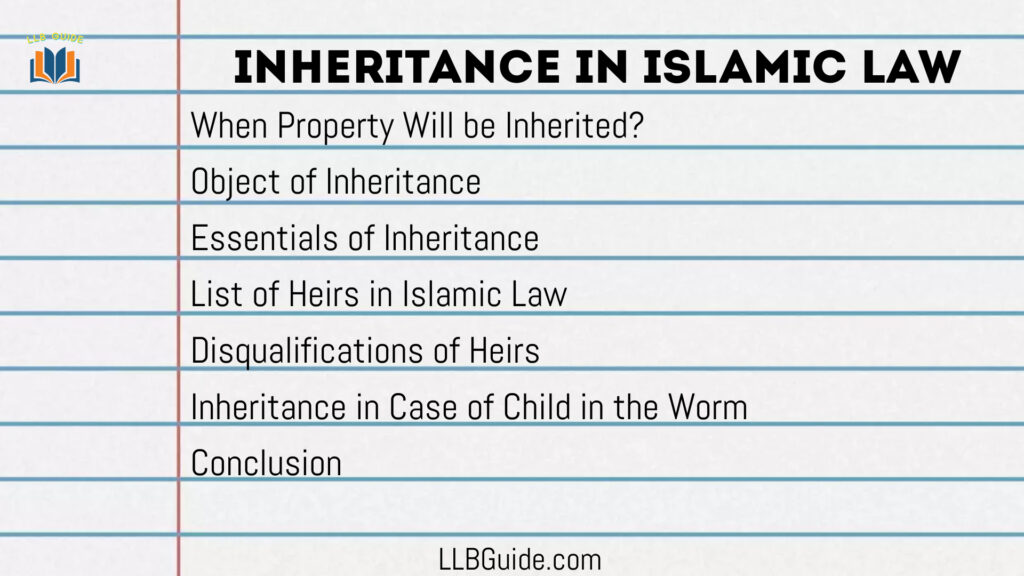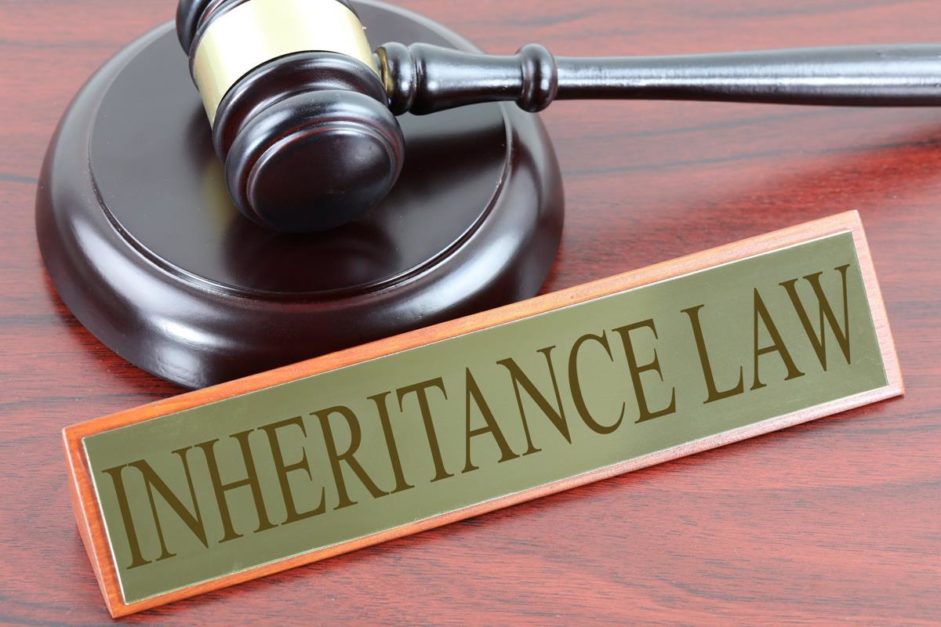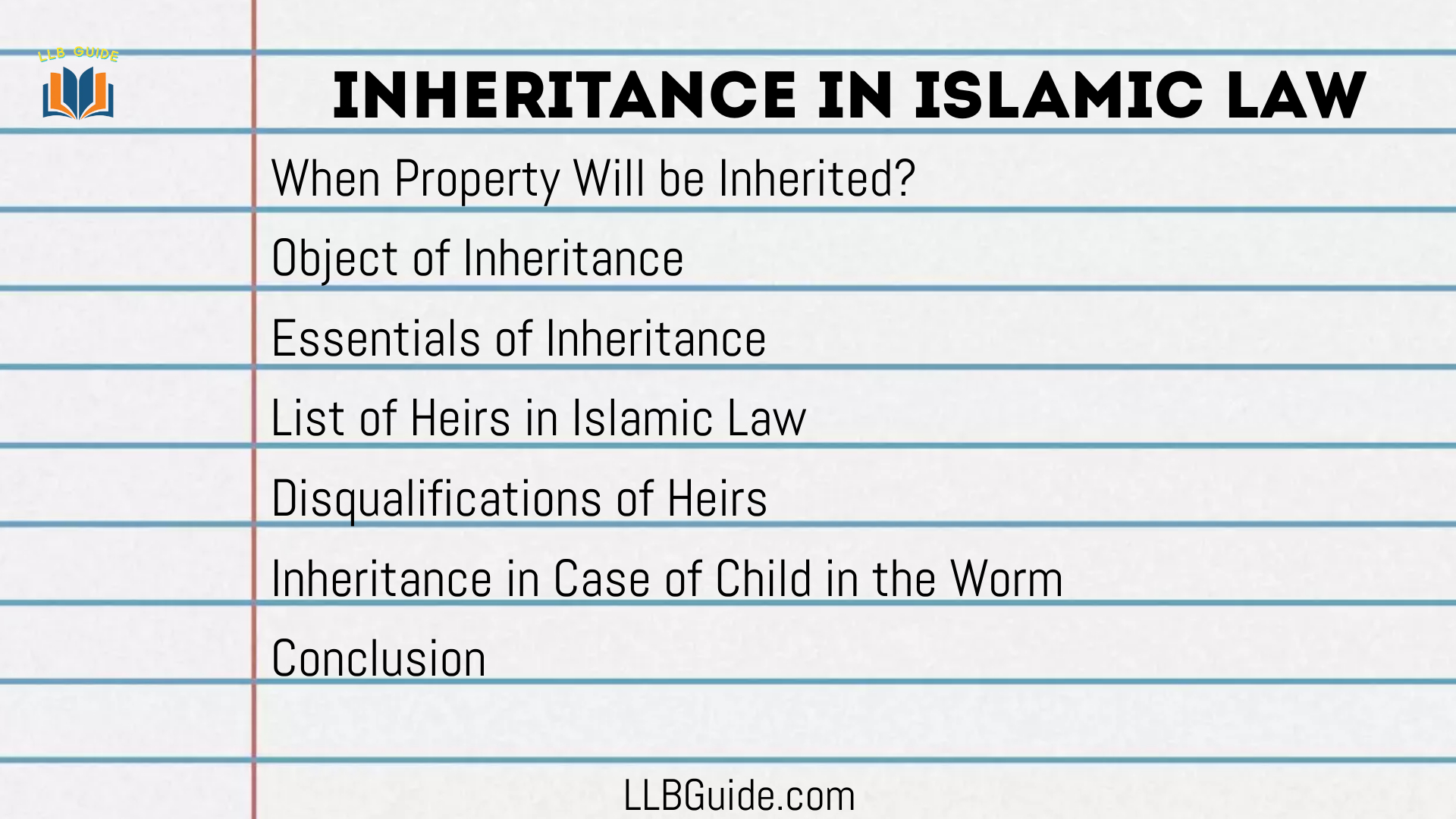Inheritance in Islamic Law has very strict and rigid rules. Inheritance means any attribute or immaterial possession that is inherited from ancestors. The property of a Muslim is inherited after his/her death. Usually, the property of the deceased is inherited by the husband, wife, son, daughter, father, and mother, if they survived the deceased, but they all can not inherit at the same time.

Table of Contents
Inheritance In Islamic Law
The rules of Inheritance in Islamic Law are explained in ‘KITAB AL-FARA’ID’. Inheritance in Muslim Law means the distribution of the property of a deceased Muhammadan among his/her legal heirs in accordance with the specific shares that are allocated by the Quran and Sunnah.

When Property be Inherited?
The property of a Muslim man or woman will be inherited after his/her death and by meeting the following obligations:
- after covering the expenses of the funeral of the deceased
- after payment of the debt of the deceased (if any)
- after payment of bequest (will) if any.
Object of Inheritance
Inheritance under Islam has the following objects or purposes:
- To extend the wealth to the society and break the centralization
- To clear the fact that man and his wealth is nothing, he will use it and pass it to other
- To build up the family system
- To protect the ownership right of legal heir
- To strengthen the economic activities
Essentials of Inheritance
For the application of inheritance in Islamic law, there must be these three:
- The Deceased: The deceased is a person whose property will be inherited.
- The Estate: There must been property of such deceased.
- Legal Heirs: Deceased Muhammadan’s heirs.
List of Heirs in Islamic Law
Islamic law has divided the legal heirs of a deceased into three categories which are and their share has been described below:
1. Sharers
Sharers are those heirs who have a definite share in the property of the deceased. Sharers include:
- Mother: The mother gets one-sixth share in case she has a child or grandchild, and one-third if there are no children.
- Father: Father gets a one-sixth share in case there is a son or a son’s son of the deceased, if there is no son or son’s son of the deceased, the father will get another one-sixth share.
- True grandfather: The grandfather gets one-sixth share if the father and mother of the deceased are not alive, if they are alive there is no share for the grandfather.
- True grandmother: The grandmother gets one-sixth share if the father of the deceased is not alive. She also gets a share even though the grandfather of the deceased is alive.
- Wife: The wife gets one-eighth in case she has children and one-fourth in case she has no children.
- Husband: husband gets one-fourth in case he has children, and one-half in case there are no children.
- Daughter: if there is only one daughter she gets a one-half share, if there is more than one daughter they will get two-thirds, in case they have a brother, they will get half of the share which he gets.
- Son’s daughter: The son’s daughter gets one-half share, if there is more than one daughter they will get two-thirds.
- Full sister: full sister also gets one-half share, if there are more than one sisters they will get two-thirds.
- Consanguine sister: consanguine sister gets one-half share, if there are more than one, they will get two-thirds.
- Uterine brother: A uterine brother gets a one-sixth share, if there is more than one uterine brother they will get one-third.
- Uterine sister: uterine sister gets a one-sixth share, if there is more than one uterine sister they will get one-third.
2. Residuaries
Residuaries are those heirs who were initially sharers but became residuary under certain circumstances which are mentioned below. These include:
- Daughter: If there exists a son, the daughter becomes residuary.
- Son’s daughter: If there is a son’s son, the son’s daughter becomes residuary .
- Son’s son’s daughter: If there exists a son’s son’s son, the son’s son’s daughter becomes residuary .
- Full sister: If there exists a full brother, a full sister becomes residuary.
- Consanguine sister: If there exists a consanguine brother, consanguine becomes residuary.
3. Distant Kindred
Distant kindred are all those blood relations who are neither sharers nor residuaries.
Disqualifications of Heirs
Under inheritance in Islam following types of heirs are not entitled to inheritance from the property of the deceased Muhammadan.
1. Apostate
An apostate is a person who changes his religion from Islam to any other religion or denies Islam, he is not entitled to inherit property from his/her deceased Muhammadan. Even in a relationship if the wife or husband becomes apostate their marriage is dissolved under Muslim Law.
2. Murderer
Under Shia Law one who intentionally murders his legal heir is not entitled to inherit from his/her property. Under Sunni Law one who intentionally or accidentally murders his legal heir, he is not entitled to inherit from his/her property.
3. Illegitimate Children
Illegitimate children of the deceased Muhammadan include children who were not born during Valid Marriage, such children are not entitled to inherit property from his estate.
Inheritance in the Case of Child in the Womb
If at the time of the death of Muhammadan, his child is in the womb of the mother, such a child is also entitled to inheritance in Islamic Law, if he/she is born alive. In the case of the death of a child in the womb of the mother, it is considered as if there was no heir.
Conclusion
To conclude I can that Inheritance in Islamic Law has very strict and rigid rules. The property of a Muslim is inherited after his/her death. Usually, the property of the deceased is inherited by the husband, wife, son, daughter, and father and mother, if they survive the deceased, but they all can not inherit at the same time.

